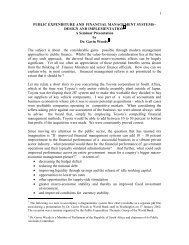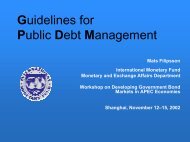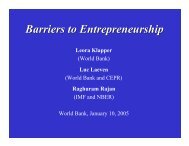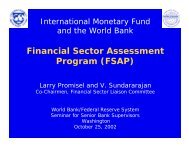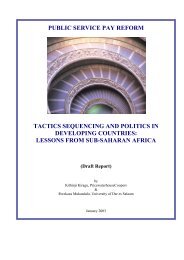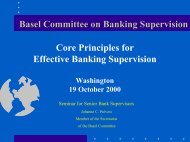CORRUPTION ASSESSMENT: MOZAMBIQUE - World Bank
CORRUPTION ASSESSMENT: MOZAMBIQUE - World Bank
CORRUPTION ASSESSMENT: MOZAMBIQUE - World Bank
Create successful ePaper yourself
Turn your PDF publications into a flip-book with our unique Google optimized e-Paper software.
Institutions to fight corruption. In the Attorney-General’s Office, a Central Office forCombating Corruption has the authority to investigate and prosecute public sectorofficials accused of fraud or abuse of power. The Public Sector Reform Technical Unit(UTRESP) conducted a corruption survey (2005) and is drafting a National Anti-Corruption Strategy that may become the basis for a comprehensive program acrossgovernment departments. If the Strategy is adopted, it is envisioned that a TechnicalCommission will guide and oversee its implementation. However, none of these effortshave yet to bear fruit in terms of significant prosecutions of corruption, institutionalchanges, or uncovering of abuses, and it is still unclear whether they are intended to makea difference or simply comply with donor expectations.Decentralization program. All 33 municipalities have now elected mayors andassemblies. These local officials are now directly accountable to their constituents forproviding services and accounting for local revenues. These elected officials represent acritical new opening in the space for democratic governance, transparency, andaccountability of officials to citizens. With expanded opportunities for participatoryplanning, electoral accountability, transparent revenue and expenditure, and othermeasures, municipalities are a potential training ground for civic rights, responsibilities,and action. Additionally, district-level Consultative Councils, while not elected, are beingestablished to increase citizen participation and the accountability of district officials.Despite these advances, oversight and monitoring activities must remain vigilant for theemergence of decentralized corruption.Public finance management systems. On the whole, public financial managementprocesses in Mozambique are fragmented and rather weak. Much donor assistance hasbeen channeled to strengthen these systems to generate more transparent and accountablerecordkeeping. The goal is to enhance budget planning, integrated expenditure tracking,and audit and control functions. Such systems have the potential to close manyopportunities for corruption that facilitate leakage of public funds. It is important to note,however, that in order to be effective, these systems must be part of much broaderinstitutional and legal reforms that will allow for greater transparency, accountability, andclear sanctions against those who misuse or misappropriate public resources.Extractive and metallurgical industries: an emerging issueIncreased accountability will be particularly important in the near future, as Mozambiquedevelops and expands its new extractive industries. Even at this early stage,Mozambique’s balance of payments has been affected considerably by its first megaprojects.Before MOZAL (Mozambique’s—and Africa’s—largest foreign directinvestment to date) started operations in 2000, exports consisted mostly of a fewagricultural products. By 2003, MOZAL’s exports already accounted for more than 50percent of total merchandise exports.With the doubling of MOZAL’s production capacity and the completion of the gaspipeline to South Africa (by Sasol), mega-projects will make up about 75 percent of totalmerchandise exports in 2005. To this must be added a titanium project that may becomeFINAL REPORT 9


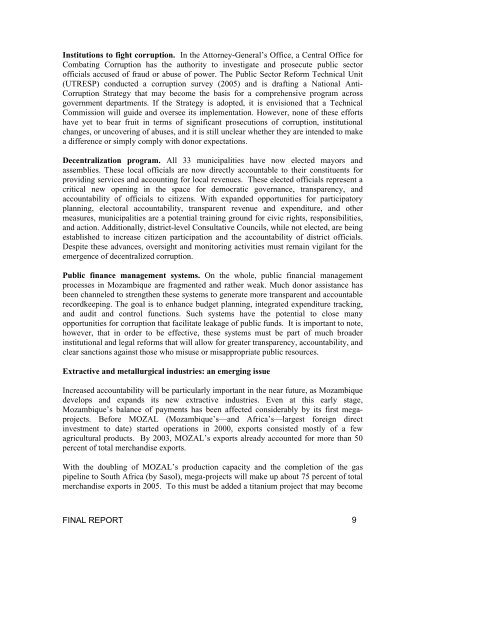
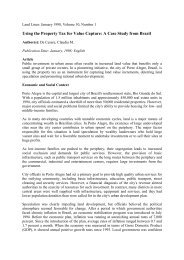

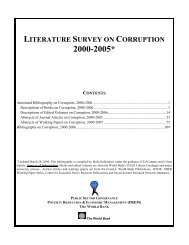
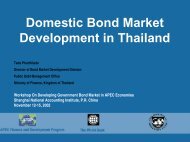
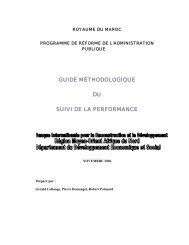
![Budget Execution: Overview [PDF 453K]; Bill Dorotinsky - World Bank](https://img.yumpu.com/47844909/1/190x143/budget-execution-overview-pdf-453k-bill-dorotinsky-world-bank.jpg?quality=85)
